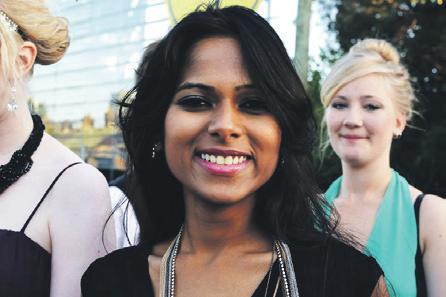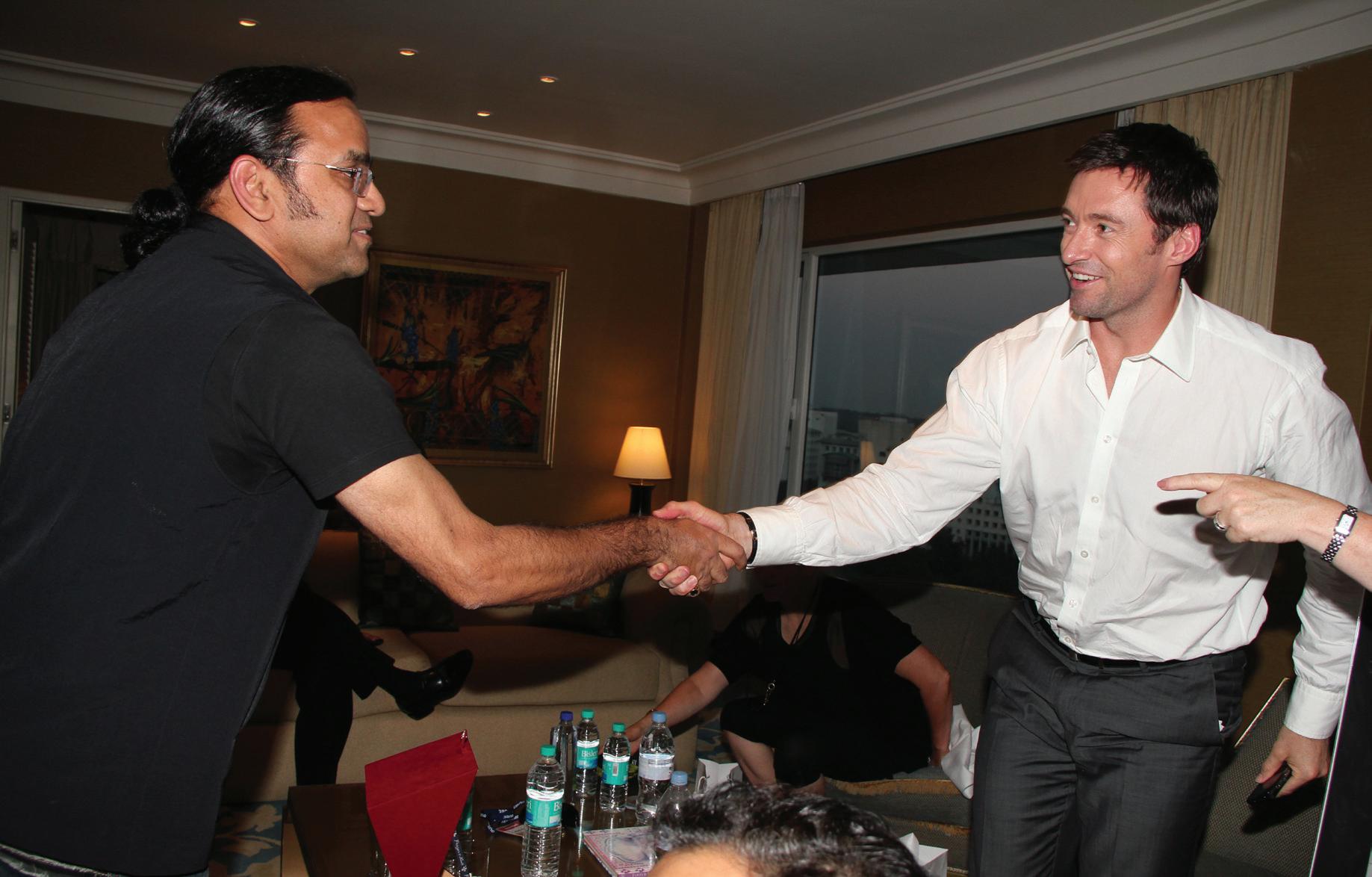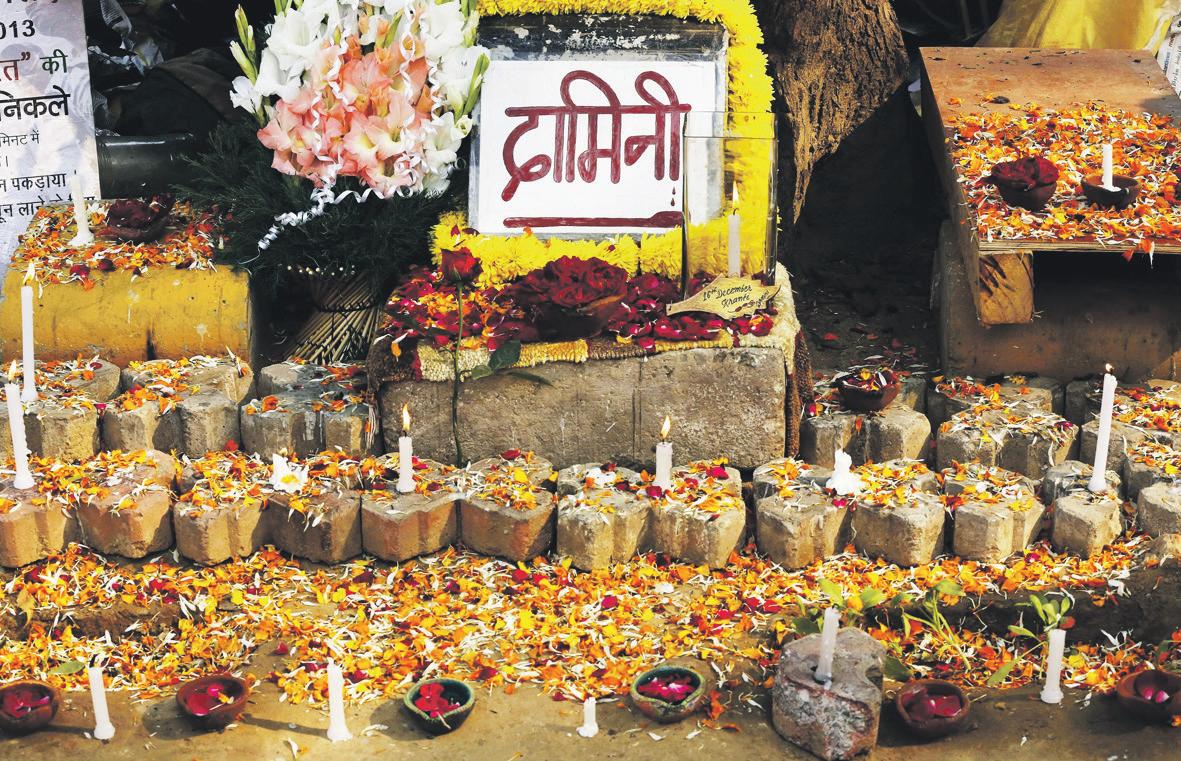
10 minute read
Indo-Oz fund to invest millions in film industry
from 2013-12 Sydney (2)
by Indian Link

The newly formed AIFF will nurture understanding between the two countries through films, serial and documentaries
In what will be a stupendous boost to the Indo-Australian film industry here, a group of Australian entrepreneurs of Indian origin headed by Sydney-based investor Devendra Gupta, have recently announced the formation of the Australian India Film Fund (AIIF), a private venture that will finance Indo-Aussie feature films, documentaries and television shows.
Utilising the 40% producer’s offset, a tax rebate meant for productions that have “significant Australian content,” the fund will trigger several million dollars worth of production and proposes to finance one Australian feature and one TV series or documentary in the next 18 months.
“We are very excited to announce this venture,” stated Yateendra Gupta, CFO of the AIFF. “With growing numbers of professional Australian investors of Indian origin, the investorfriendly Australian film space and the success of India centric western films, we are anticipating a long term presence supporting Australian stories. We want to nurture understanding between India and Australia through the films and documentaries we decide to fund,” he added.
Australia’s leading film professional working with India, Anupam Sharma, has been appointed as AIFF’s Head of Films. Also on board is Fox Studio-based Company, Films & Casting TEMPLE to produce the Fund’s investment in Australian screen content. “It is important for us to entrust our finances and resources in professional hands with impeccable reputation,” said Mr Gupta. Anupam Sharma “has an enviable reputation for professionalism over hundreds of Australia-India projects,” he further explained.
Anupam Sharma spoke to Indian Link about his involvement in the venture and the future he envisages for the AIFF.
Mr Sharma has recently been appointed as the Australia Day Ambassador and has directed several top Bollywood movies like Dil Chahta Hai and Heyy Babyy, which were shot in Australia. He also holds a Masters degree in Film and Theatre from the University of New South Wales.
“We believe it is the right time to invest in the Australian film industry’s niche projects and redefine the form and content of an ‘Australian Story,’” stated Mr Sharma. “India-centric stories like the UK’s Bend it Like Beckham have resonated with global audiences, and we hope to do the same from Australia. We have professional crews, a producer’s offset and a strong Indian diaspora. With this fund, Australia can be more than just a service provider for the Indian film industry, but an active participant in India-centric film projects,” he explained.
With at least 90% of the crew and 80% of the cast being local and a high percentage of shooting done in Australia, the very best case scenario is the AIFF funding a feature and a documentary every year for years to come. This has obvious benefits for Australian professionals in films specially those of Indian origin. “One of the keys for a good film is getting independent finance to maintain independence of creativity,” stated Mr Sharma.
So what are the major themes of movies and documentaries on which the fund will focus? “There is no preset agenda. We will be looking at good stories which are Australian and combining the Australian body with the Indian soul. The production set up, completion bonds, accounting structures, distribution, international sales etc. etc., will all be as per western standards. The emotions, the colour, the music, the soul will be Indian,” explained Mr Sharma.
He further reiterated that all aspects of modern Australian culture which has intriguing stories, will be considered, whether they are of Indian, Pakistani or Bangladeshi Australians, which are now Australian stories. So will such a venture help to recognise, acknowledge and even create Indo-Aus identities among people who belong to both countries? “I think such identities already exist. Mainstream films between India and Australia will legitimise such identities and bring them out of the ‘ethnic pigeonhole’,” said Mr Sharma, also stating that the AIFF could raise issues and voices about say, domestic violence or student issues.
The directors of AIFF have been impressed with the outcome of their months of research which confirm that there is a high level of transparency, security, and financial benefits in the Australian film space. Film and media are proven to be effective tools for better bilateral relations between two nations.
This much-needed injection of private investment into the local film industry has been enthusiastically welcomed. “AIFF’s decision to completely fund projects will also hopefully take financial pressure off agencies such as Screen Australia who have been so enthusiastically pushing better links between India and Australia,” said Mr Sharma.
Screen Australia’s CEO, Graeme Mason said, “It’s terrific to see more opportunities for Australian filmmakers to explore stories with a unique viewpoint. India and Australia have great shared stories to tell”.
Commitments are in place for initial projects, and applications will soon be invited for ongoing funding rounds. The first projects are expected to be announced in the new year.
The fund will trigger several million dollars worth of production and proposes to finance one Australian feature and one TV series or documentary in the next 18 months
“We will be looking at good stories which are Australian and combining the Australian body with the Indian soul”
Delhiites pay homage to Damini, the name given by the Indian media to the Delhi rape victim, at Jantar Mantar on 16 December. Events across the Indian capital marked the anniversary of the fatal gang rape of a 23-year-old student, which provoked widespread outrage and led to stricter laws against sexual assault

Anti-apartheid icon Nelson Mandela laid
to rest
The world’s anti-apartheid icon and South Africa’s first non-white president Nelson Mandela was laid to rest on Dec 15 at his ancestral home in Qunu village in Eastern Cape province at a state funeral.
Mandela’s body was placed in his final resting place, alongside his other family members at the Mandela family farm in rural Qunu, South Africa’s government news agency SA News reported.
Traditional rituals were performed to ensure Mandela is received by his ancestors.
The funeral marked the end of a 10-day mourning period, declared by President Jacob Zuma after the elderly statesman passed away at his home Dec 5 in Houghton, Johannesburg at the age of 95.
Following a beautiful and sombre funeral service at a specially-erected marquee earlier, Mandela’s body, draped in the South African national flag, was taken to the family farm.
Once the family members and president were seated, military officials undraped the casket and the flag was ceremoniously folded and handed to Zuma, who handed it to Mandela’s widow Graca Machel.
The national anthem was played and the South African Air Force flew a salute flight before the last post was sounded.
The burial itself was not telecast and no pictures were allowed - to afford the family and dignitaries to say their personal and final goodbyes in private.
Earlier, speakers hailed Mandela at the funeral service, with all paying moving tributes to South Africa’s first democratically elected non-white president.
Among the dignitaries present were current and former heads of state and other eminent people, including Britain’s Prince Charles, Reverend Jesse Jackson, Sinn Féin leader Gerry Adams, businessman Richard Branson and talk show host Oprah Winfrey.
South Africa’s Nobel Peace laureate Archbishop Desmond Tutu also attended Mandela’s funeral. Earlier, Tutu said he cancelled his flight to the Eastern Cape to attend Mandela’s funeral after he received no indication that his name was on the guest list.
South African President Jacob Zuma said the government and the country will take forward the legacy of Mandela. Zuma also thanked the Mandela family for their perseverance over the years when the world icon spent 27 years in jail during the apartheid regime.
“As your journey today, ours must continue. One thing we can assure you today, as you take your final steps, is that South Africa will continue to rise,” Zuma said.
Describing Mandela as a “fountain of wisdom, pillar of strength and a beacon of hope,” Zuma said Mandela taught the country to live together, regardless of race.
Ahmed Kathrada, the Indian-origin veteran anti-apartheid activist and for years aide to Nelson Mandela, moved many mourners to tears when he paid a poignant tribute to the late statesman.
“When Walter (Sisulu) died, I lost a father, when you died I lost a brother, now I don’t know who to turn to,” Kathrada said, facing Mandela’s casket.
Walter Sisulu was a South African antiapartheid activist and member of the African National Congress (ANC). Kathrada and Mandela were both imprisoned in Robben Island for their political views.
Malawi’s President Joyce Banda said she was inspired by Mandela, who had a spirit of forgiveness.
African Union chair and Ethiopian Prime Minister Hailemariam Desalegn said Mandela’s life was a record of all the trials the African countries had to endure under colonialism.
Tanzania’s President Jakaya Kikwete said the people of Tanzania have lost a great friend, a great comrade in arms.
Over a lakh Muslims take pledge against terror
Over one lakh Muslims recently took an oath against terrorism and to spread the message that Islam is a religion of peace and has always promoted harmony.
The ceremony, organised by the Jamiate-Ulema-e-Hind, was held at the Ramlila ground in New Delhi, and came after a twoday conference attended by clerics of Jamiate-Ulemas in the Maldives, Britain, Sri Lanka, Pakistan, Nepal, Bangladesh and Myanmar at Deoband in Uttar Pradesh’s Saharanpur district, where it was decided to set up a forum to promote world peace.
“The forum will help promote peace and make the entire world understand that the motive of Islam is to promote peace and harmony. Islam has always wanted that peace prevails in the world,” Jamiat-e-Ulema general secretary Maulana Arshad Madani said in address in the capital.
Only better understanding and a proper universal brotherhood will bridge the rift among people and let the world live in peace, he added.
“Freedom is the basic human right of every person in the world and by spreading terrorism, a lot of organisations have just tried to sabotage tranquillity prevailing in the world,” said Maulana Madani.
Speaking on the occasion, Jamiat-e-UlemaPakistan (Fazlur) chief Fazlur Rahman maintained that peace cannot prevail as long as “atrocities are done on the people by the dictators in a society”.
“Today the issue of terrorism is not just limited to Afghanistan and Pakistan but has affected almost all the nations of the world, which has made it immensely important for the people to come together and tackle all such sort of issues to let peace prevail in the society,” he said.
30 years in making, Tejas finally ready for production
Three decades after the project started, India’s Light Combat Aircraft (LCA) Tejas is all set for initial operational clearance and production, Defence Research and Development Organisation (DRDO) chief Avinash Chander said recently in New Delhi.
The DRDO got permission to start the programme to design and develop an indigenous Light Combat Aircraft way back in 1983.
“The ten-tonne category indigenous Tejas has gone through the full operational envelop of its speed, angle of attack, different manoeuvres it can make, different types of loads it can carry, weather conditions and high altitude operations,” Chander, who also serves as scientific advisor to the defence minister, said in an interview to the “War and Peace” program of state-run TV channel Doordarshan News.
“It gives us the confidence that the aircraft is now ready for production (at the facilities of Hindustan Aeronautics Ltd). HAL has been chosen as its production agency,” he said.
Chander made it clear that Tejas would continue its production cycles with imported American GE engines.
“If you see the world, aircraft are built around a proven engine and once it is a flying aircraft, we seldom change the engine,” he said.
Asked whether there could be any hurdles in production because of the imported American engines, he said: “Given our relationship with different countries in the world, we don’t anticipate any problems”.
Chander said the indigenous Kaveri engine project would continue for future unmanned aerial vehicles.
“It will be possible for unmanned aerial vehicles to take off from naval platforms like the INS Jalashwa,” he said.
For the next round of indigenous 20-tonne category medium combat aircraft project, India “will go for some technology partnership to develop some new engine of that class of aircraft,” said the DRDO chief.
‘Sheriff of Wall Street’ Preet Bharara strikes again
Manhattan’s US Attorney Preetinder Singh “Preet” Bharara, dubbed “Sheriff of Wall Street” by Time magazine, has struck again with the arrest of a senior Indian diplomat on charges of visa fraud and exploiting her housekeeper.
But Devyani Khobragade, 39, India’s Deputy Consul General in New York, accused of making her babysitter work for peanuts is not the first Indian to be prosecuted by the famous Indian American attorney whose exploits put him on the cover of Time in 2012. His most famous ‘victims’ in a four-year insider trading crackdown that has won him a record 76 convictions, include India-born former Goldman Sachs director Rajat Gupta and his Sri Lankan hedge fund billionaire friend Raj Rajaratnam.
The Rajaratnam case also brought down former McKinsey & Company senior executives Anil Kumar, Rajiv Goel, a midlevel Intel Capital executive.
In November 2013, Bharara made former Indian internet analyst Sandeep Aggarwal plead guilty to providing inside information about a pending deal between Microsoft and Yahoo to a portfolio manager at SAC Capital.
Then in the second week of December, Bharara charged 49 Russian diplomats and their spouses with scamming Medicaid, a government health care programme for low-income families out of $1.5 million over a decade.
The 49 current or former Russian diplomats and their spouses living in New York City were accused of participating in a widespread fraud scheme to illegally obtain benefits under Medicaid.
No respecter of riches or fame, Harvardeducated Bharara, 45, has vowed to keep up his crusade, saying he has the “greatest job in the world” though he will “walk the earth and get into adventures” whenever he retires.
Badal, Sharif agree to boost cooperation between Punjabs
Indian and Pakistani Punjab’s chief ministers, Parkash Singh Badal and Shahbaz Sharif respectively, recently agreed to boost cooperation, including through exchange of academicians, and people to people contacts between their two regions.
A joint statement from Amritsar said that both sides during their talks agreed “to promote cooperation for the common interest of peace, harmony, economic growth and leveraging each other’s potential”.










